

Cell Phone Policies: A Review of Where Faculty Stand. In December we asked readers to share their policies on the use of cell phones and other electronic devices in class.
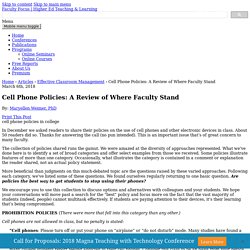
About 50 readers did so. Thanks for answering the call (no pun intended). This is an important issue that’s of great concern to many faculty. The collection of policies shared runs the gamut. We were amazed at the diversity of approaches represented. More beneficial than judgments on this much-debated topic are the questions raised by these varied approaches. We encourage you to use this collection to discuss options and alternatives with colleagues and your students. PROHIBITION POLICIES (There were more that fell into this category than any other.) Cell phones are not allowed in class, but no penalty is stated:
Becoming a Teacher. Preparing for guest speakers. I think it is nice to have guest speakers in my classes because they offer different perspectives on topics, and are often much better equipped than I am to talk about how things happen and work in the professional world for which the students are preparing.
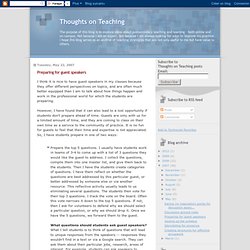
However, I have found that it can also lead to a lost opportunity if students don't prepare ahead of time. Active Learning For The College Classroom. The past decade has seen an explosion of interest among college faculty in the teaching methods variously grouped under the terms 'active learning' and 'cooperative learning'.
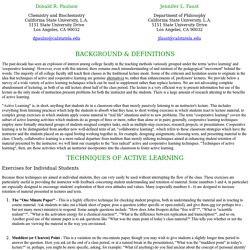
However, even with this interest, there remains much misunderstanding of and mistrust of the pedagogical "movement" behind the words. The majority of all college faculty still teach their classes in the traditional lecture mode. Some of the criticism and hesitation seems to originate in the idea that techniques of active and cooperative learning are genuine alternatives to, rather than enhancements of, professors' lectures. We provide below a survey of a wide variety of active learning techniques which can be used to supplement rather than replace lectures.
We are not advocating complete abandonment of lecturing, as both of us still lecture about half of the class period. "Active Learning" is, in short, anything that students do in a classroom other than merely passively listening to an instructor's lecture. 10 Assessment Design Tips for Increasing Online Student Retention, Satisfaction and Learning. February 3, 2014 By: Bernard Bull, EdD in Online Education.
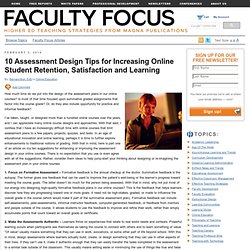
Frequently Asked Questions. Fun Large Group Ice Breakers. Another Shoe Game Everybody takes of a shoe from one side (lets say right side) and throw that shoe in a pile.
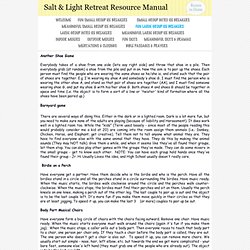
Then everybody grab (at random) a shoe from the pile and put in on. Now the aim is to pair up the shoes. Each person must find the people who are wearing the same shoes as he/she is, and stand such that the pair of shoes are together. E.g. Barnyard game There are several ways of doing this. Teaching & Learning Center. First Day of Class Activities-Icebreakers Honolulu Community College -Teaching Tips "The First Day".
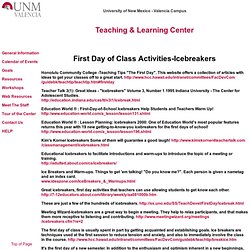
This website offers a collection of articles with ideas to get your classes off to a great start. Teacher Talk 3(1): Great Ideas - "Icebreakers" Volume 3, Number 1 1995 Indiana University - The Center for Adolescent Studies. Education World ® : First-Day-of-School Icebreakers Help Students and Teachers Warm Up! Http:/www.education-world.com/a_lesson/lesson131.shtml. IceBreakers. Center for Teaching Excellence - Lansing Community College. "... meeting a group of strangers who will affect your well being, is at the same time exciting and anxiety producing for both students and teacher.
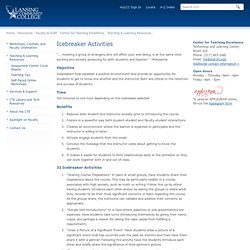
" - McKeachie Objective Icebreakers help establish a positive environment and provide an opportunity for students to get to know one another and the instructor. New 'TED Talks Education' Brings Big Names And Big Ideas. Copyright Crash Course Online Tutorial - CEET NING. From the University of Texas, the Copyright Crash Course Online Tutorial will help you learn about how ownership of copyrighted materials works, what is fair use and when and how to get permission to use someone else's materials.
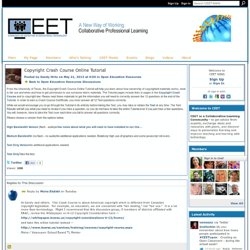
The Tutorial pages include links to pages in the Copyright Crash Course and to copyright law. Please read these materials to get the information you will need to correctly answer the 12 questions at the end of the Tutorial. In order to earn a Crash Course Certificate, you must answer all 12 Test questions correctly. While we would encourage you to go through the Tutorial in its entirety before taking the Test, you may take or retake the Test at any time.
The Test Results will tell you what you need to review if you miss a question, so you do not have to take the entire Tutorial over if you just miss a few questions. Please choose a version from the options below. How To Combat Student Plagiarism. Plagiarism, defined as the “wrongful appropriation” of another’s words or ideas, is a pervasive problem in schools.
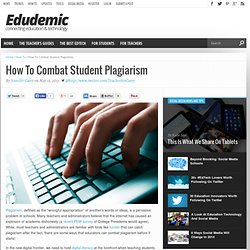
Many teachers and administrators believe that the internet has caused an explosion of academic dishonesty (a recent PEW survey of College Presidents would agree). While, most teachers and administrators are familiar with tools like turnitin that can catch plagiarism after the fact, there are some ways that educators can combat plagiarism before it starts! In the new digital frontier, we need to hold digital literacy at the forefront when teaching students how to use and incorporate material into their work. Today’s students are used to rapid answers to questions via quick searches (again, verified by PEW in “How Teens Do Research”). Provide students with meaningful lessons and examples of “real world” plagiarism. 02-EdPsy-Chap02-6123. Undergrad-tech.jpg (800×3017)